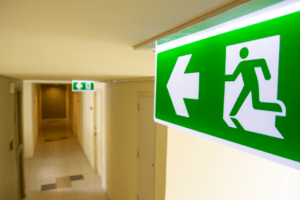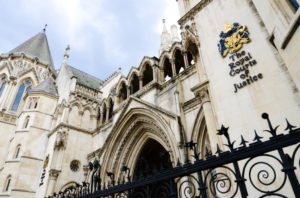The competency of fire risk assessors has come under the spotlight in recent years since the tragic Grenfell Tower fire, Dame Hackitt’s review and subsequent legislative and regulatory reform. But what happens when a fire risk assessor finds themselves under investigation by the authorities? Hannah Eales from law firm, Kingsley Napley, explores.
Can a Fire Risk Assessor be deemed a responsible person under the Fire Safety Order[1]?

Hannah Eales, Partner at Kingsley Napley
Yes. Article 5(3) of the Fire Safety Order imposes a duty on ‘every person, other than the responsible person… who has, to any extent, control of those premises so far as the requirements relate to matters within his control.’ Article 5(4) provides that a person who has, by virtue of any contract or tenancy, an obligation of any extent in relation to the safety of any premises, is to be treated as a person who has control of the premises for the purpose of article 5(3) to the extent that his obligation so extends.
I have dealt with cases where the enforcing fire and rescue authority have commenced proceedings against fire risk assessors and fire risk assessment companies for breaches of the Fire Safety Order, deeming them responsible persons under articles 5(3) and 5(4).
What is the most common breach alleged against Fire Risk Assessors?
The most common breach alleged and investigated is a breach of article 9 (the making of a suitable and sufficient risk assessment.) Prosecuting fire and rescue authorities will often question the suitability and sufficiency of a fire risk assessment in the particular circumstances of a given case. The question as to whether the fire risk assessment is suitable and sufficient will often require expert opinion.
What happens if I am investigated as a Fire Risk Assessor?
Interview/written questions under caution
 The enforcing fire and rescue authority will likely invite the individual or the Director of the company to an interview under caution. Alternatively the fire and rescue authority may invite a response to written questions under caution in writing. Interviews under caution are conducted under the principles of the Police and Criminal Evidence Act 1984 (“PACE”), which concerns the powers of the enforcement authority, the rights of individuals under investigation and the admissibility of evidence.
The enforcing fire and rescue authority will likely invite the individual or the Director of the company to an interview under caution. Alternatively the fire and rescue authority may invite a response to written questions under caution in writing. Interviews under caution are conducted under the principles of the Police and Criminal Evidence Act 1984 (“PACE”), which concerns the powers of the enforcement authority, the rights of individuals under investigation and the admissibility of evidence.
Questions asked and answered are under the caution as follows:
‘You do not have to say anything, but it may harm your defence if you do not answer when questioned something which you rely on in Court. Anything you do say may be given in evidence.’
Importantly, the individual must be notified that any participation in an interview under caution, or providing a response to written questions under caution, is voluntary and they are under no obligation to participate. Failing to provide an account may of course have consequences later on should the matter proceed, but this is a matter that should be discussed with a lawyer, which brings me onto my next point- the individual is also entitled to consult a lawyer and this should be made clear at the outset.
The alleged breach of the Order should be explained to the individual so that they understand fully what they are being investigated for. For a failure or breach to amount to a criminal offence under the Order it must have placed one or more relevant persons at risk of death or serious injury in case of fire. So it will be necessary for the enforcing authority to explain how the alleged breach led to that placing at risk of death or serious injury in case of fire.
By way of example, in the case of a fire risk assessor being investigated for a breach of the Order in respect of article 9, the fire and rescue authority would need to show how the fire risk assessment was not suitable and sufficient and how that failure to make a suitable and sufficient fire risk assessment placed one or more relevant persons at risk of death or serious injury in case of fire. For clarity- relevant persons means any person (including the responsible person) who is or may lawfully be on the premises and any person in the immediate vicinity of the premises who is at risk from a fire on the premises.
Prosecution
 In some cases the enforcing authority will take the decision based on the answers provided under caution to take no further action. In others, they may decide to proceed to prosecution. Should the matter proceed to prosecution, in cases involving questions over the suitability and sufficiency of a fire risk assessment, it will often be necessary to instruct an expert to provide an opinion on the suitability and sufficiency of the FRA in the circumstances and whether any failures in the FRA placed one or more relevant persons at risk of death or serious injury in case of fire.
In some cases the enforcing authority will take the decision based on the answers provided under caution to take no further action. In others, they may decide to proceed to prosecution. Should the matter proceed to prosecution, in cases involving questions over the suitability and sufficiency of a fire risk assessment, it will often be necessary to instruct an expert to provide an opinion on the suitability and sufficiency of the FRA in the circumstances and whether any failures in the FRA placed one or more relevant persons at risk of death or serious injury in case of fire.
Offences under article 32 in respect of a breach of article 9 can be dealt with in the Magistrates’ Court or the Crown Court. Should an individual plead guilty or be found guilty after trial, they are liable to an unlimited fine and/or up to two years in prison.
What can I do as a fire risk assessor to avoid investigation and prosecution?
There is a huge focus on fire risk assessors and competency in the current climate, particularly on third party accreditation for both individual fire risk assessors and fire risk assessment companies. The Fire Sector Federation published an Industry Benchmark Standard in December 2022.
The document sets out key competency requirements for fire risk assessors across tiers to deal with increasingly complex risk. It is anticipated that the Industry Benchmark Standard will become a British Standard in due course.
The Home Office has also recently introduced the Interim (Fire Risk Assessor) Competence Verification Board (ICVB) which will work with industry leaders to ensure assessors have the necessary capabilities to carry out fire risk assessments. In addition to the ICVB, the Home Office is establishing an Industry Engagement Group to provide a forum for those working in the fire sector to keep up to date on key developments.
Aside from ensuring competence within the particular field within which you work, it is important to consider third party accreditation through organisations such as the Institute of Fire Safety Managers or the Institution of Fire Engineers. This will enable you to register according to your experience, ability and the complexity of your work.
Ultimately, ensuring you are competent for the work you undertake, in the field you undertake is key and obtaining third party accreditation will assist in ensuring that your work is of the required standard. It is a defence under the Fire Safety Order to prove that you took all reasonable precautions and exercised all due diligence to avoid the commission of an offence, so ensuring your competence and obtaining third party accreditation are paramount.
[1] Regulatory Reform (Fire Safety) Order 2005
Fire Safety in 2023 eBook
SHP's sister site, IFSEC Insider has released its annual Fire Safety Report for 2023, keeping you up to date with the biggest news and prosecution stories from around the industry.
Chapters include important updates such as the Fire Safety (England) Regulations 2022 and an overview of the new British Standard for the digital management of fire safety information.
Plus, explore the growing risks of lithium-ion battery fires and hear from experts in disability evacuation and social housing.


 The enforcing fire and rescue authority will likely invite the individual or the Director of the company to an interview under caution. Alternatively the fire and rescue authority may invite a response to written questions under caution in writing. Interviews under caution are conducted under the principles of the Police and Criminal Evidence Act 1984 (“PACE”), which concerns the powers of the enforcement authority, the rights of individuals under investigation and the admissibility of evidence.
The enforcing fire and rescue authority will likely invite the individual or the Director of the company to an interview under caution. Alternatively the fire and rescue authority may invite a response to written questions under caution in writing. Interviews under caution are conducted under the principles of the Police and Criminal Evidence Act 1984 (“PACE”), which concerns the powers of the enforcement authority, the rights of individuals under investigation and the admissibility of evidence. In some cases the enforcing authority will take the decision based on the answers provided under caution to take no further action. In others, they may decide to proceed to prosecution. Should the matter proceed to prosecution, in cases involving questions over the suitability and sufficiency of a fire risk assessment, it will often be necessary to instruct an expert to provide an opinion on the suitability and sufficiency of the FRA in the circumstances and whether any failures in the FRA placed one or more relevant persons at risk of death or serious injury in case of fire.
In some cases the enforcing authority will take the decision based on the answers provided under caution to take no further action. In others, they may decide to proceed to prosecution. Should the matter proceed to prosecution, in cases involving questions over the suitability and sufficiency of a fire risk assessment, it will often be necessary to instruct an expert to provide an opinion on the suitability and sufficiency of the FRA in the circumstances and whether any failures in the FRA placed one or more relevant persons at risk of death or serious injury in case of fire.